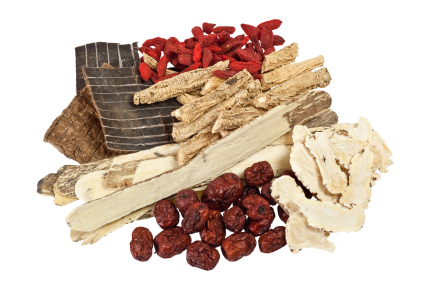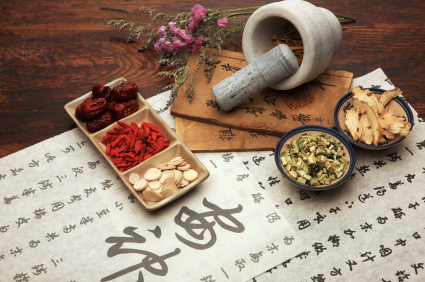


Introduction to Chinese Herbal Medicine
Chinese herbal medicine has been successfully used for thousands of years to treat certain diseases and alleviate discomfort caused by many different disorders. The first written herbal classic dated back to the Qin Dynasty (221-206 BC). Now thousands of natural plants are catalogued in Chinese Herbal Pharmacopeia. The vast majority of these are plant parts such as barks, roots, leaves, twigs, flowers or fruits. Entirely sourced from nature, herbal medicine is the closest treatment the complementary world has to conventional medicine. In fact, many herbs provide the blueprint for today’s western medical drugs, including aspirin, strychnine, vincristine, taxol, curare, and ergot etc.
Each herb has its unique properties, ie. its Qi (energy), flavour, movement and the meridian to which it is associated. An herbal formula (commonly a combination of 8-16 different herbs) rather than a single herb is often prescribed by a Chinese Medical practitioner so that the optimal effect of the herbal medicine can be achieved. The number of herbs in the mixture, the amount of each herb and the dosage of the herbal mixture prescribed depend on the individuals, the nature of the patient’s condition and the Chinese Medicine diagnosis.
Different Preparations of Herbal Medicine
Raw herbs/herbal decoction (herbal tea)
This is the traditional way of taking herbal medicine. The raw herbs are usually processed in various ways, such as cleaning, soaking, slicing, cooking and drying, etc. according to the methods that have been reported to be most appropriate to keep its function A mixture of dried raw herbs is prescribed, packed and given to a patient. The herbal mixture needs to be cooked to make an herbal decoction (herbal tea) by soaking, boiling and simmering the herbs. The herbal tea is usually taken two times a day.
Concentrated herbal powders/granules
This form of herbs is relatively new. It became available thanks to the recent advanced technology. The concentrated herbal powders/granules are manufactured by GMP certified Pharmaceutical companies. Individual raw herbs are carefully selected, cleaned, boiled, extracted, separated, and concentrated; and then are made into granules or powders. This form of herbs provides a convenient and an effective option for those who live a busy life and have no time to cook the raw herbs or for those who travel during the treatments. The concentrated herbal powders/granules need to be dissolved in boiling water or boiled briefly in water to make an herbal tea. The herbal tea is usually taken two times a day.
Herbal capsules/tablets
Herbal capsules/tablets containing a mixture of granulated/powdered herbs are prepared by your Chinese Medicine doctor after the consultation. This form of herbs is suitable for those who find the herbal tea difficult to take. The herbal capsules/tablets are conveniently taken with warm water and are usually taken two times a day.
Safety of Chinese Herbal Medicine
Appropriately prescribed by a qualified experienced practitioner, herbs can be taken alone or as a safe complementary/alternative treatment to conventional drugs. The herbs we use in your treatment are all officially approved and quality controlled in the UK, mostly imported by top suppliers in the UK from specialist growers in China. Random testing of raw herbs, herbal powders/granules made in the U.S. and UK indicate that they are free of harmful bacteria, heavy metal and chemical contaminants. Negative interactions with Western drugs have not been noted for any of the common herbs when used in the normal dosage range. Occasionally, a few people experience allergic reaction to individual herbs, a problem that often cannot be predicted in advance since these are very rare individual responses. A more common reaction is a gastro-intestinal response, which might include constipation, diarrhea, nausea or bloating. Such reactions may occur if the individual has poor digestive functions, or if the herbal formula is not quite right for the conditions of the individual. Taking the herbs at a different time in relation to meals may be helpful in resolving some of the gastro-intestinal responses. If such responses persist after several days of taking the herbs, it may be necessary to change the herbal formulas.
We do not use any animal products or endangered species of herbs.
General Caution When Taking Herbal Medicine
Be sure to inform your practitioner before you start taking your herbal medicine: 1). If you are on any medications, vitamins and dietary supplements; 2). If you are pregnant or breast-feeding.
If you would like to know more about the treatment, please feel free to contact us.